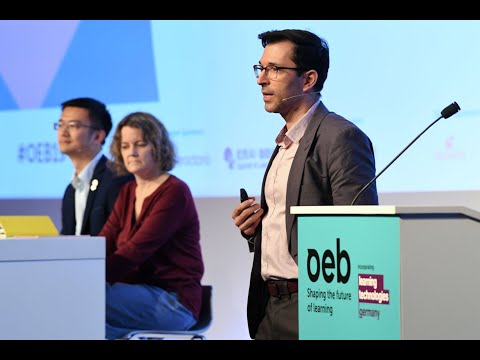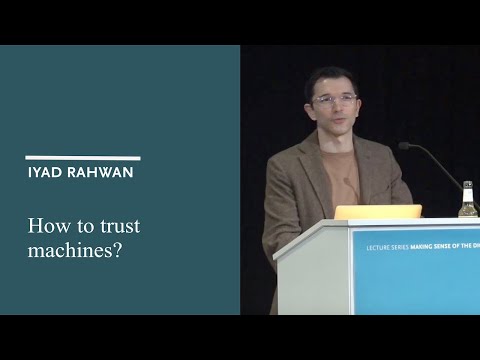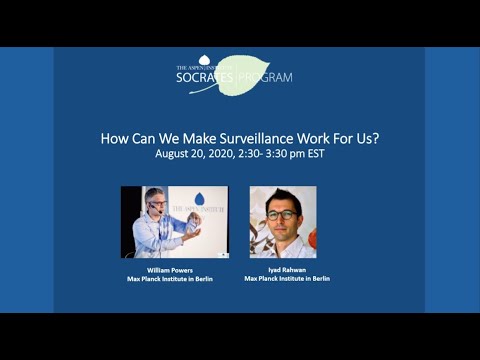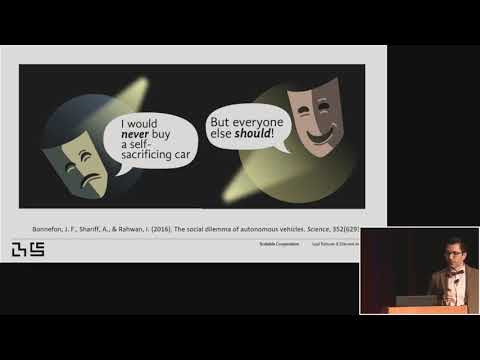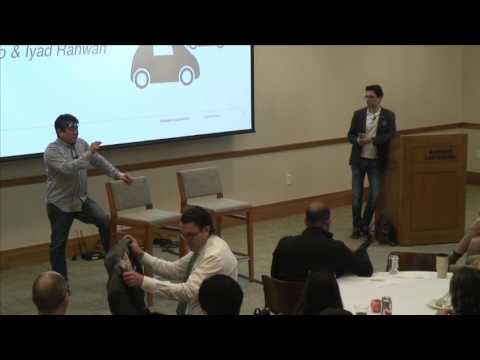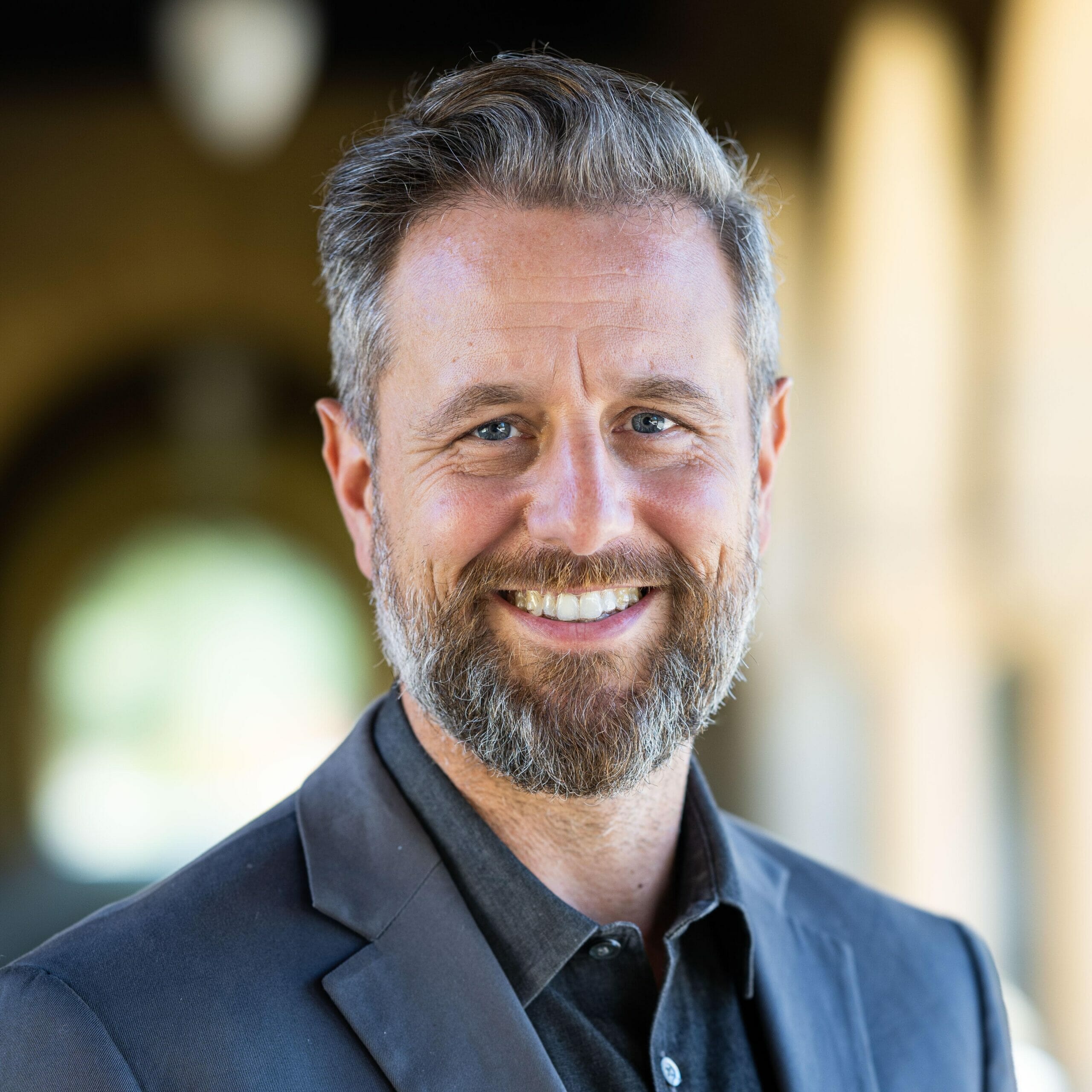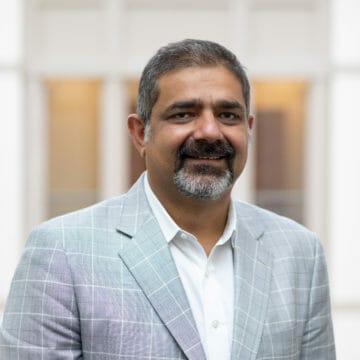Videos
Learn More About Iyad Rahwan
Had we understood in advance how technology and social media would later impact humans, could we have prevented the problems we see today and shaped a different future? The good news is, organizations can now make more informed, strategic decisions around technologies they build and use before they invest by leveraging the science-backed forecasts provided by acclaimed futurist, computer scientist and pioneering artificial intelligence (AI) scholar Iyad Rahwan.
Director of the Center for Humans & Machines at the Max Planck Institute for Human Development, Rahwan and his diverse team of more than 20 interdisciplinary researchers – including computer scientists, physicists, psychologists, economists and political scientists – conduct unique experiments grounded in behavioral science. Their ongoing research shows how rapidly emerging technologies driven by AI, including virtual reality (VR), augmented reality (AR) and the metaverse, will shape the way people think, learn, work, play, cooperate and govern. Their data-driven scientific insights give organizations and individuals the information they need to strategically invest in and plan for the future with a higher level of certainty about likely outcomes.
“People have recognized that machines impact our lives. And with AI, increasingly those machines have autonomy in how they shape us,” says Rahwan, who was named to the Thinkers50 Radar Class of 2020 and a top AI visionary in the Arabic world. “Understanding how these new AI agents behave and misbehave, and how their behavior impacts human psychology, social norms, economic behavior and culture, is becoming the defining question of our time.”
A widely respected computer scientist whose earlier work at MIT led to his being dubbed the anthropologist of AI, Rahwan is particularly focused on helping organizations understand the ethical implications of the technologies they develop and use. Author of the darkly funny Evil AI Cartoons, which playfully highlight AI’s potential harms, Rahwan closely examines the upsides and downsides of autonomous vehicles, surveillance, machine learning, automation, Deep Fakes, and Human+AI creativity. More recently he and his colleagues have been studying how human networks can be leveraged in ways that improve collaboration and cooperation and combat corruption.
In addition to helping leaders better read and extract value from data, Rahwan shows them how AI and humans will complement each other in the future workplace.
“When people predict a job may disappear, they tend to ask if a machine can replace those skills,” he explains. “But typically, machines don’t replace a whole person, just part of their skills. In some cases, machines make a person more productive, which can lower prices and increase the demand for more people. Organizations will need to analyze many factors when it comes to matching machines with people and determining the best way to fill the skills gaps.”
As organizations move toward a new technological era, Rahwan’s future-focused guidance continues to be of great value to leaders in every sector as they prepare for an increasingly AI-driven workplace and economy.
###
Iyad Rahwan is an honorary professor of Electrical Engineering and Computer Science at the Technical University of Berlin. Until June 2020, he was an Associate Professor of Media Arts & Sciences at the Massachusetts Institute of Technology (MIT). He is a lifetime Member of the Association for Computing Machinery (ACM) and Association for the Advancement of Artificial Intelligence (AAAI).
Rahwan’s work has appeared in major academic journals, including Science, Nature and PNAS, and features regularly in major media outlets, including The New York Times, The Economist and The Wall Street Journal. A native of Aleppo, Syria, he holds a PhD from the University of Melbourne, Australia.
Iyad Rahwan is available to advise your organization via virtual and in-person consulting meetings, interactive workshops and customized keynotes through the exclusive representation of Stern Speakers & Advisors, a division of Stern Strategy Group®.
How AI Will Accelerate Innovation
AI is revolutionizing our ability to innovate in science, engineering, design, business and entertainment. Accelerating both the discovery of new ideas and the exchange and recombination of those ideas, AI can now represent very high-dimensional relationships that are difficult for humans to describe in words. As Director of the Center for Humans & Machines at the Max Planck Institute for Human Development, Iyad Rahwan understands how AI will advance human learning. An engaging and interactive speaker, he unveils the latest developments in AI (e.g., Deep Learning, text generation models, image generation algorithms, recommendation engines) and describes how they impact the creative process. After developing an appreciation of the emerging ethical, social and economic risks and challenges that accompany these new technological capabilities, audiences will discover from this talk how AI can be used as a tool, assistant, collaborator, and inventor.
How Emerging Technologies Will Impact the Future of Business and Society
The way humans engage with the world is increasingly driven by technology. The good news is, organizations can now make more informed, strategic decisions around technologies they build and use before they invest. In this talk, acclaimed futurist, computer scientist and AI scholar Iyad Rahwan, director of the Center for Humans & Machines at the Max Planck Institute for Human Development, discusses his team’s ongoing research, which shows how rapidly emerging technologies driven by AI, including virtual reality (VR), augmented reality (AR) and the metaverse, will shape the way people think, learn, work, play, cooperate and govern. His careful experimental and data-driven insights give participants the information they need to strategically invest in and plan for the future with a higher level of certainty about likely outcomes.
Strategically Planning for the Future of Work
How can companies best prepare for a future workplace where AI and automation will require a different set of human skills? Computer scientist Iyad Rahwan teaches organizations how to create strategic maps outlining occupations and skillsets that will – or will likely not – become automated. He also shares strategies for addressing these issues defensively so leaders can future-proof their organization and workforce.
The Ethics of Artificial Intelligence
Designing and deploying Artificial Intelligence (AI) that can be trusted is an extremely delicate process. Iyad Rahwan, an expert on the social impact of AI, discusses the ethical challenges of ensuring AI systems, such as autonomous vehicles (AVs), are safe and that their algorithms can be trusted. He explores how cultural differences and psychological biases, such as people’s inflated views of their own driving abilities, can make them reluctant to cede their power to AI, even when it is superior. In this riveting presentation, Rahwan explores the complex intersection of humans, AI and autonomous vehicles and what it means for AI developers, industry and society.
How Can We Make Surveillance Work for Us?
While new technologies allow for vast corporate and government surveillance, can the equation be leveraged in profoundly beneficial ways? AI expert Iyad Rahwan argues that in the face of inevitable and ongoing technological progress, appropriate degrees of privacy and regulation must be implemented regarding the use of data and algorithmic decision making. In this presentation, he discusses the use of surveillance to promote the public good, such as contact tracing during a pandemic, versus other more questionable, potentially unethical uses of surveillance that may infringe on personal privacy or convey dangerous biases.
Leveraging Social Media to Encourage Extreme Cooperation
The internet and social media have revolutionized our ability to cooperate at scale. Iyad Rahwan explores the physical and cognitive limits of crowds by following real-world experiments that utilized social media to mobilize the masses in tasks of unprecedented complexity. From finding people in remote cities, to reconstructing shredded documents, to canvassing an entire continent in search of balloons, the power of crowdsourcing is real. So are the exploitation, sabotage and hidden biases that undermine that power. To effectively leverage social media, we need to understand both the wisdom and madness of crowds. In this presentation, Rahwan shows how to harness collective efforts for constructive purposes – and combat malicious manipulation that can turn loose the fury of the mob.

Toward Human-Centered AI Management: Methodological Challenges and Future Directions
(Technovation, March 2024)

A Psychological Model Predicts Fears about Artificial Intelligence across 20 Countries and 6 Domains of Application
(PsyArXiv Preprints, October 2023)

The Moral Psychology of Artificial Intelligence
(Annual Review of Psychology (Review in Advance), September 2023)

Polarized Citizen Preferences for the Ethical Allocation of Scarce Medical Resources in 20 Countries
(MDM Policy & Practice, July 2022)

Expanding the Measurement of Culture With a Sample of Two Billion Humans
(Journal of the Royal Society Interface, May 2022)

The Promise and Perils of Using Artificial Intelligence To Fight Corruption
(Nature Machine Intelligence May, 2022)

Automation Impacts On China’s Polarized Job Market
(Journal of Computational Social Science, July 2021)
Bad Machines Corrupt Good Morals
(Nature Human Behaviour, June 2021)

Modularity and Composite Diversity Affect the Collective Gathering of Information Online
(Nature Communications, May 2021)

Behavioural Evidence for a Transparency-Efficiency Tradeoff in Human-Machine Cooperation
(Nature Machine Intelligence, November 2019)
Improve Investment Decisions and Society by Understanding the Future Impact of Technology on Humans
Acclaimed futurist, computer scientist and AI scholar Iyad Rahwan, director of the Center for Humans & Machines at the Max Planck Institute for Human Development, leads a diverse team of more than 20 interdisciplinary researchers who conduct unique experiments grounded in behavioral science. Their data help organizations understand and anticipate how rapidly emerging advances in digital media and AI will shape the way people think, learn, work, play, cooperate and govern. As an advisor, he shares the meticulously curated data his team gathers with decision makers to help them shape the future of their business and society with more certainty about likely outcomes. He works with organizations in every industry and can cover any or all of the following topics during virtual or in-person advisory meetings, which can be customized to meet the needs of your organization and the size of your audience.
- The Future of Autonomous Vehicles: Safety, Ethics, Investment
- Financial and Business Implications of an AI-driven Economy and Society
- Future of Work: Human-AI Cooperation and Collaboration
- How Virtual Reality (VR) and Augmented Reality (AR) Will Shape Society and Business
- AI and Bias: Ethical Approaches to Developing Technology
- Machine Learning and Algorithms: Preventing Harm While Leveraging Benefits
- Extracting Value from Data
- Building Successful Collaboration Through Social Networks
- The Future of Surveillance: How to Make It Work for Society and Business
- The Impact of Artificial Intelligence on Biology, Economics, Consumer Behavior, Psychology, and Sciences
- Strategically Investing in the Future of Automation

